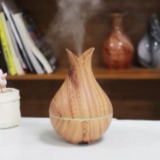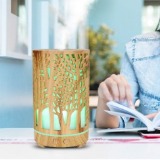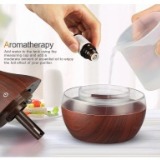What is the difference between a humidifier and a diffuser?
A humidifier adds moisture to the air to combat dryness, while a diffuser disperses essential oils into the air for aromatherapy purposes.
Can a humidifier also work as essential oil diffuser?
Certain humidifiers can support essential oils. Check the product specifications to be clear.
What features to look for when buying a humidifier or diffuser?
Look for tank capacity, mist output, noise level, auto shut-off, cleaning ease, and compatibility with essential oils (for diffusers).
Usage Questions
How long should I run my humidifier or diffuser each day
Run a humidifier for 8-12 hours depending on humidity needs, and diffuser for 15-30 minutes to avoid overexposure to essential oils.
Should I use distilled water or tap water in my humidifier
Distilled water is recommended to prevent mineral buildup and reduce the spread of impurities in the air. Since it doesn't require much water, using distilled or drinking water won't increase much cost, while ensuring clean mist for breathing.
Can I sleep with a humidifier or diffuser on overnight?
You can safely sleep with a humidifier on, but for a diffuser, it's best to limit exposure to 30-60 minutes only.
How do I know if the humidity in my room is appropriate?
Humidifiers naturally help maintain an appropriate humidity level (40-60%), you can use a hygrometer to check. Signs of high humidity include mold growth, foggy windows, or musty odors. Low humidity will cause dry skin and nose, coughing, or static electricity.
Health & Safety Questions
Are there any health risks to using a humidifier or diffuser daily?
Humidifiers can harbor mold if not cleaned properly. Essential oils from diffusers may cause irritation if overused or inhaled for too long.
Can using a humidifier help with allergies or asthma?
Yes, a humidifier can reduce dryness in the air, which helps ease allergy and asthma symptoms
Are essential oil diffusers safe for babies, pets, or pregnant women?
Use caution. Some essential oils (like eucalyptus) can be harmful to pets, babies, and pregnant women. Do some quick research before purchasing is recommended.
Is it safe to inhale essential oil vapor from a diffuser? Which essential oils are safe?
Yes, it’s safe to inhale essential oil vapor if you use 100% pure, natural oils free from synthetic fragrances, phthalates, and solvents. Avoid "fragrance oil" or "perfume oil".
Cleaning & Maintenance Question
How often should I clean my humidifier or diffuser?
It's essential to clean it every 7 days to prevent mold, bacteria, and mineral buildup.
Soak with a water-vinegar solution and scrub gently with a soft brush
Why is my humidifier not producing mist or steam?
The problem could be a clogged nozzle, dirty filter, or insufficient water level. Clean it, refill the tank, and check the instructions
What should I do if my diffuser stops working?
Check the water level, clean the unit, and inspect the power supply. If issues persist, refer to the user manual or contact us.
Environmental Impact Questions
-
Are humidifiers and diffusers environmentally friendly?
Yes, they are energy-efficient and can improve air quality, but regular cleaning and proper disposal are necessary to avoid waste. -
Can I recycle a broken humidifier or diffuser?
Yes, but it depends on local recycling guidelines. Electronic components may need to be taken to an e-waste recycling facility.
Learn more about our product line and find the ones that best suit your need.
At Line Tech Care, we care about air quality and your health.
Contact us for more details & Follow us on LinkedIn



